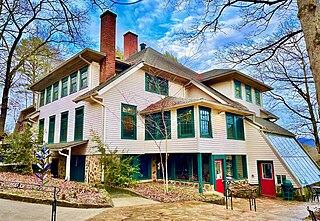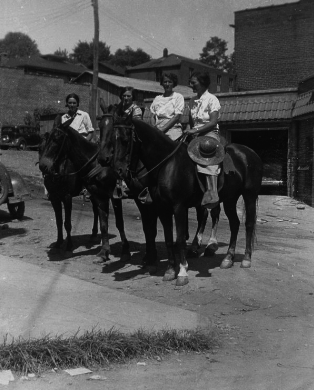
Hindman is a home rule-class town in, and the county seat of, Knott County, Kentucky, in the United States. The population was 701 at the 2020 U.S. Census.
The Grawemeyer Award for Music Composition is an annual prize instituted by Henry Charles Grawemeyer, industrialist and entrepreneur, at the University of Louisville in 1984. The award was first given in 1985. Subsequently, the Grawemeyer Award was expanded to other categories: Ideas Improving World Order, Education (1989), Religion (1990) and Psychology (2000). The prize fund was initially an endowment of US$9 million from the Grawemeyer Foundation. The initial awards were for $150 000 each, increasing to $200 000 for the year 2000 awards. After the economic crash of 2008, the prize was reduced to $100,000.

Kentucky Educational Television (KET) is a statewide television network serving the U.S. commonwealth of Kentucky, a member of PBS. It is operated by the Kentucky Authority for Educational Television, an agency of the Kentucky state government, which provides more than half of its annual funding. KET is the dominant public broadcaster in the commonwealth, with transmitters covering the vast majority of the state as well as parts of adjacent states; the only other PBS member in Kentucky is WKYU-TV in Bowling Green. KET is the largest PBS state network in the United States; the broadcast signals of its sixteen stations cover almost all of the state, as well as parts of Illinois, Indiana, Missouri, Ohio, Tennessee, Virginia, and West Virginia. The network's offices, network center, and primary studio facilities are located at the O. Leonard Press Telecommunications Center on Cooper Drive in Lexington; KET also has production centers in Louisville and at the Kentucky State Capitol Annex in Frankfort.

Lawrence Winchester Wetherby was an American politician who served as Lieutenant Governor and Governor of Kentucky. He was the first of only two Kentucky governors born in Jefferson County, despite the fact that Louisville is the state's most populous city. The second governor born in Jefferson County is the incumbent governor, Andy Beshear, who grew up in the Lexington area. Two other governors have been elected when residents of Jefferson: Augustus Willson, 1907-11, and Matt Bevin, 2015-19.

The Kentucky Community and Technical College System (KCTCS) is the system of public community and technical colleges in the U.S. state of Kentucky. It is headquartered in Versailles, Kentucky, and has 16 colleges with over 70 campuses. Programs offered include associate degrees; pre-baccalaureate education to transfer to a public 4-year institution; adult education, continuing and developmental education; customized training for business and industry; and distance learning. KCTCS was founded as part of the Postsecondary Improvement Act of 1997, signed by former Kentucky Governor Paul E. Patton, to create a new institution to replace the University of Kentucky's Community College System and the Kentucky Department of Education's network of technical schools. The Kentucky Fire Commission, a separate state entity responsible for training emergency responders, also became part of KCTCS at that time.

Bertram Thomas Combs was an American jurist and politician from the Commonwealth of Kentucky. After serving on the Kentucky Court of Appeals, he was elected the 50th Governor of Kentucky in 1959 on his second run for the office. Following his gubernatorial term, he was appointed to serve as a United States circuit judge of the United States Court of Appeals for the Sixth Circuit by President Lyndon B. Johnson, serving from 1967 to 1970.

Management of dyslexia depends on a multitude of variables; there is no one specific strategy or set of strategies that will work for all who have dyslexia.

Settlement schools are social reform institutions established in rural Appalachia in the early 20th century with the purpose of educating mountain children and improving their isolated rural communities.
Hindman Settlement School is a settlement school located in Hindman, Kentucky in Knott County. Established in 1902, it was the first rural settlement school in America. It is financially supported by the Daughters of the American Revolution.

The 2002 United States Senate election in Kentucky was held on November 5, 2002. Incumbent Republican U.S. Senator Mitch McConnell won re-election to a fourth term. This election was McConnell's biggest margin of victory to date. It is the only election in which he won Franklin County, and the most recent in which he won urban Jefferson and Fayette counties. The latter two were the only Kentucky counties won by either Hillary Clinton in 2016 or Joe Biden in 2020, signifying their leftward drift.
Kate Griggs is a British social entrepreneur best known for her work in the field of dyslexia. She is the founder of the dyslexia charitable organisation, Xtraordinary People. Her public speaking has ranged from the Conservative Party Conference to appearances on television and radio.

Dyslexia Action is an organisation based in Staines-upon-Thames, Surrey, England, founded in 1972.

OpenDyslexic is a free typeface/font designed to mitigate some of the common reading errors caused by dyslexia. The typeface was created by Abbie Gonzalez, who released it through an open-source license. The design is based on DejaVu Sans, also an open-source font.
The Kildonan School was a private coeducational boarding and day school in Amenia, New York for students with dyslexia and language-based learning disabilities. It offered daily one-to-one Orton-Gillingham language remediation and a college preparatory curriculum for students in grades 2-12 and PG (post-graduate).

Judit Kormos is a Hungarian linguist. She is a professor and the Director of Studies for the MA TESOL Distance programme at the Department of Linguistics and English Language at Lancaster University, United Kingdom. She is renowned for her work on motivation in second language learning, and self-regulation in second language writing. Her current interest is in dyslexia in second language learning.

The Pack Horse Library Project was a Works Progress Administration (WPA) program that delivered books to remote regions in the Appalachian Mountains between 1935 and 1943. Women were very involved in the project which eventually had 30 different libraries serving 100,000 people. Pack horse librarians were known by many different names including "book women," "book ladies," and "packsaddle librarians." The project helped employ around 200 people and reached around 100,000 residents in rural Kentucky.

Helen Dingman was an American academic and social worker who was one of the central figures in the Progressive and New Deal eras to bring social and economic reform to Appalachia. After teaching in Massachusetts for five years from 1912 to 1917, Dingman moved to Kentucky to establish the Smith Community Life School under the auspices of the United Presbyterian Church. Serving as principal and directing six other schools in Harlan County, Kentucky, she provided both education and social services to the community until 1922. After a two-year placement as an assistant superintendent for the mission board in New York, she was hired as a teacher in the Sociology Department at Berea College. She taught social work courses and trained teachers for the rural schools in the region until 1952. In addition, she served as Executive Secretary of the Conference of Southern Mountain Workers, establishing the professional basis for social workers. The first comprehensive economic and social survey of the Southern Appalachias was spearheaded by Dingman.
Beth Slingerland was an educator who developed a classroom adaptation of the Orton-Gillingham system for teaching dyslexic children.

Bernice Irene Sumlin was an American educator. She became the nineteenth international president of the Alpha Kappa Alpha sorority in 1974. She was a national vice president of the National Council of Negro Women. She was born and died in Dayton, Ohio.














